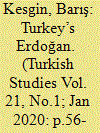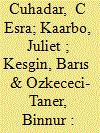|
|
|
Sort Order |
|
|
|
Items / Page
|
|
|
|
|
|
|
| Srl | Item |
| 1 |
ID:
193631


|
|
|
|
|
| Summary/Abstract |
This study uses leadership trait analysis to examine the link between personality and policy regarding South Korea’s Sunshine Policy toward North Korea and demonstrates that Kim Dae-jung’s personality characteristics largely accounted for this policy’s content, process, and outcome. With an analytical focus on the decision-making system, this study finds that Kim’s formal model was characterized by a control deemed inherently more indirect, subtle, and socialized than direct, personalized, or outright. Specifically, this type of control can be attributed to Kim’s personality traits, such as a persistently high need for power and relationship focus, along with other idiosyncratic style variables, such as disinclination toward interpersonal conflict, a sense of efficacy, and a sophisticated cognitive quality. President Kim’s resulting management style had the effect of empowering members of his advisory group and invigorating the policy process. In addition, the president’s trusted chief of staff, who served as a competent and thoughtful custodian manager with substantial authority, helped manage the system effectively and enhanced its stability. The study concludes that Kim Dae-jung’s management style, incorporating socialized control over decision-making, combined with his advocate leadership style in implementation (marked by a relentless push for his rapprochement agenda and a tendency to challenge constraints indirectly), helped accelerate the overall policy process. This contributed to the improvement of inter-Korean relations during his presidency.
|
|
|
|
|
|
|
|
|
|
|
|
|
|
|
|
| 2 |
ID:
174019


|
|
|
|
|
| Summary/Abstract |
Political leaders appeal to home audiences as well as ‘others’ beyond the state’s borders. Using leadership trait analysis, in the example of Turkey’s Recep Tayyip Erdoğan, this paper questions if and why a leader can exhibit different leadership traits and styles at home and away. The paper is concerned with how Erdoğan's leadership traits and style connect to Turkish foreign policy between March 2003 and May 2013. First, two profiles of Erdoğan are assessed from the interviews he gave to domestic and foreign press. The paper then reports Erdoğan’s profiles by distinguishing between different Western, Eastern, European, American, and Middle Eastern audiences. Based on these profiles, this paper argues that Erdoğan has two different profiles at home and away. Furthermore, it finds that Erdoğan’s profile from his foreign policy interviews with American news outlets stand out from his other profiles. Among other traits, Erdoğan’s task focus changes noticeably among audiences.
|
|
|
|
|
|
|
|
|
|
|
|
|
|
|
|
| 3 |
ID:
178597


|
|
|
|
|
| Summary/Abstract |
Using both quantitative and qualitative research techniques, we investigate the effect of leaders’ style and personality on foreign policy. The study examines six Turkish leaders, Süleyman Demirel, Bülent Ecevit, Necmettin Erbakan, Recep Tayyip Erdoğan, Abdullah Gül, and Turgut Özal, and 18 foreign policy cases to answer the following questions: do Turkish leaders differ from each other in terms of their personality traits and styles?; how did their styles affect their foreign policy choices?; and how did they react to various domestic and international constraints they encountered in cases of foreign policy? Our findings suggest that: (a) in terms of their personality traits, Turkish leaders do not collectively fit in one category; (b) there are some stark differences among our six leaders, although some leaders are more similar to each other than others in terms of their personality traits and styles; (c) these differences were observable in the foreign policy decisions they made.
|
|
|
|
|
|
|
|
|
|
|
|
|
|
|
|
|
|
|
|
|